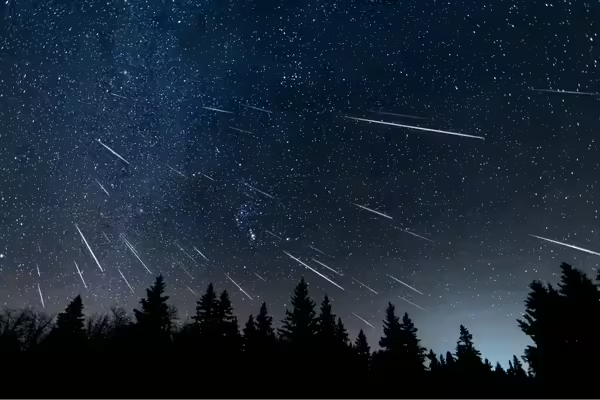
FAIRBURY, Ill. — Summer nights are my absolute favorite. From running around in grass fields and seeing lightning bugs to the sounds of crickets and cicadas, summer nights hold such warmth and beauty in the natural world. As the day quiets down, the stars come out, and that too leaves me in awe. One of my favorite events that Extension hosts is a Meteor Shower Watch Party, and we are gearing up for our 3rd annual event!
On Saturday, July 26, from 8:30 to 10:30 PM, Master Naturalists are hosting this event to share about our night sky at Fugate Woods Nature Preserve. In collaboration with Prairie Lands Foundation, we host local astronomer Paul Pouliot out for the evening to be our “guide to the sky.” From meteors to comets, Paul will walk us through these wonders.
We invite you to join us for the evening! Please bring a blanket or lawn chair, a warm drink, bug spray, and a flashlight. This event is open to all but is recommended for ages 5 and up. We will be meeting on the south side of the preserve near the Boy Scout Pavilion.
To register and for more information, visit extension.illinois.edu/lmw/events. If you have any questions or need a reasonable accommodation, please contact Alison Meanor at ameanor@illinois.edu or call our office at 309-663-8306.
University of Illinois Extension develops educational programs, extends knowledge, and builds partnerships to support people, communities, and their environments as part of the state's land-grant institution. Extension serves as the leading public outreach effort for University of Illinois Urbana-Champaign and the College of Agricultural, Consumer and Environmental Sciences in all 102 Illinois counties through a network of 27 multi-county units and over 700 staff statewide. Extension’s mission is responsive to eight strategic priorities — community, economy, environment, food and agriculture, health, partnerships, technology and discovery, and workforce excellence — that are served through six program areas — 4-H youth development, agriculture and agribusiness, community and economic development, family and consumer science, integrated health disparities, and natural resources, environment, and energy.